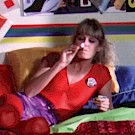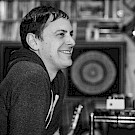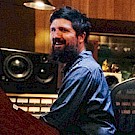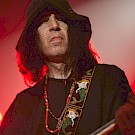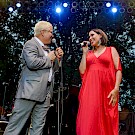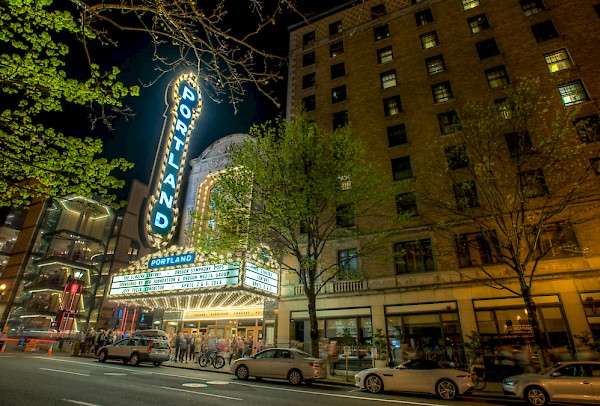 Arlene Schnitzer Concert Hall: Photo by Ken AaronYou’ve sold out the Schnitz. You’ve toured the world. You’ve made it. Right?
Arlene Schnitzer Concert Hall: Photo by Ken AaronYou’ve sold out the Schnitz. You’ve toured the world. You’ve made it. Right?
Whether you’re Chris Funk and your band—The Decemberists—have reached No. 1 on Billboard’s album chart while nurturing a devoted fan base, or you’re Storm Large and you’ve seen your career go from the beer-soaked rock club Dante’s, to reality television on CBS, to sharing the stage with Pink Martini and the Oregon Symphony, you’ll still find yourself in the continual process of making it.
“There is no it,” Large emphasizes. “It’s a constant making.” Even after you’ve played Carnegie Hall as she has, “that’s not the end—that’s not it.”
In simple layman’s terms, “making it means you don’t have a day job,” Funk blurts out with a chuckle. Being financially stable is one side of the coin, but “really making it means you’re waking up every day and you are doing exactly what you want to be doing, what you were put on the earth to be doing. If you have to go work in a cubicle or wash dishes and you hate it, then you’re not making it,” he laughs.
While the Portland of yore facilitated both Large and Funk’s burgeoning music careers in the early aughts, thanks to cheap rent and a vibrant creative scene, not all is lost in Portland of present.
When Large arrived 15 years ago, “it was just this really supportive community of dirtbags, sweating it out in clubs, and we respected and supported each other’s work.”
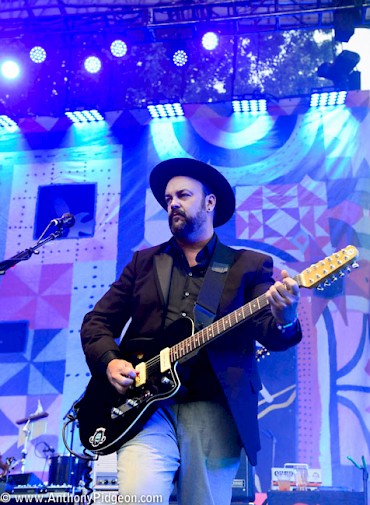 Chris Funk on the first of two sold-out nights with The Decemberists at Edgefield in 2015—click to see more photos by Anthony PidgeonThe bustling scene contributed to the formation of The Decemberists as transplants Colin Meloy and Funk met out and about. “Musicians just find musicians,” Funk says. And while there was a certain spirit in the air back then, Funk still believes “it’s inspiring and exciting,” especially with “so many young, amazing bands right now.”
Chris Funk on the first of two sold-out nights with The Decemberists at Edgefield in 2015—click to see more photos by Anthony PidgeonThe bustling scene contributed to the formation of The Decemberists as transplants Colin Meloy and Funk met out and about. “Musicians just find musicians,” Funk says. And while there was a certain spirit in the air back then, Funk still believes “it’s inspiring and exciting,” especially with “so many young, amazing bands right now.”
“I was very supported by this city and by fans and other musicians—it was very inclusive,” Large says. “And it still feels that way.”
Portland is unconventional, Large says. Audiences have always been open to oddball artists and genres continue to mix fluidly on bills across town. This welcoming, collaborative vibe spurs creativity and permeates the scene. While the city may be an incubator and serve as a catalyst, Portland is not where you go to make it.
“You’ve got to make your opportunity somewhere else and then come here to crash,” says Hutch Harris of The Thermals with a laugh. “I’ve known a lot of smaller bands that move here and then they end up moving away because they thought it was a town where you come in and get signed and get recognized, but it’s not.”
If your goal is success—however you quantify that—you cannot get complacent in Portland. For many things, you need to look outside the city. Besides, “If you want to make money [and think] ‘I’m going to be a musician,’ you’re a fucking idiot,” Large laughs. It’s a tough but rewarding lifestyle and you must be talented, ambitious and “very brave these days.”
You must also understand that there are two distinct aspects to a career as a professional musician: making music and performing it. “The making of the record is the art gallery part of the craft and the live show is the entertainment,” Funk explains. “People go and they drink beer and they look at you. You’re an entertainer; that’s not a musician. It’s very different” than crafting ideas from scratch and recording in a studio. “You have to be satisfied with both,” he says.
In your effort to look beyond Portland, touring is paramount to getting your name out there. “It’s hard to balance between digging ditches [traveling and playing shows every night] and being an architect—creating something because you want to,” Large explains. Performing often pays the bills while creating keeps you happy and sane, and enables the touring to continue. Being an independent musician is a business, Large says, and the balance is where your business and creative drives come together. “But most artists are motivated to create because it’s something that’s in their head,” Large says.
Artists should focus on being genuine because “I still think people respond to good songs,” Funk says, “and if you have undeniable music, a good album and a killer live show, people will find their way to you.”
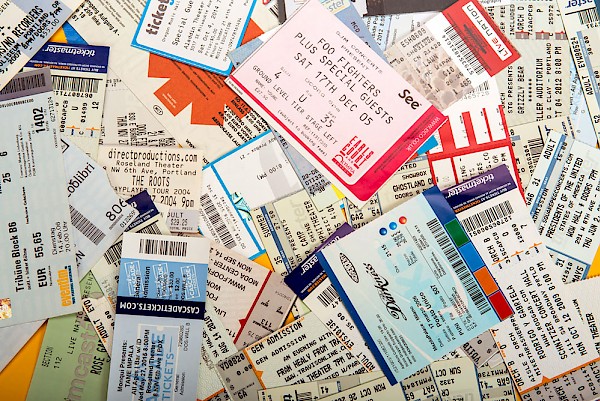 Photo by Ken AaronYet being good isn’t enough. The modern musician also needs to be a creative entrepreneur. And at some point, you will need to seek outside help. But many professional music industry services may still be lacking in Portland.
Photo by Ken AaronYet being good isn’t enough. The modern musician also needs to be a creative entrepreneur. And at some point, you will need to seek outside help. But many professional music industry services may still be lacking in Portland.
“It seems like an industry is building up,” The Dandy Warhols’ Zia McCabe says. “There sure are a million bands and they need people to help, but most of the ones I know seem to be on the DIY end of the spectrum still.”
A band like The Dandys get most of their professional services outside of Portland because no one here is offering the level of service they need, while Large has longstanding relationships with her team, most of whom reside on the East Coast.
Portland definitely has “a scene but not much industry,” McCabe says. Funk believes “there’s a lot of talent here that could be grown if there were more managers” and other opportunities for artist development. Yet, these musicians also feel some uncertainty commenting on the professional institutions available in Portland because they’re just not sure. And this speaks to the fact that they’re not getting these services locally, and that musicians of all stripes are unaware of what does exist locally—or even what they should be seeking in the first place.
“The history of where industry is is still Nashville, New York and L.A.,” Funk says. “Portland is a very young city—all this change and interest in our city is very recent” while “there is arguably a hundred years of business in some of these [other] places.”
Making it is a hustle, and an insecure one at that. Even Funk and Large find their footing somewhat unsteady at times.
“You never know when it’s going to end because you don’t get to pick,” Funk explains. “The audience is your judge. It’s really an out-of-control feeling when you break it down.”
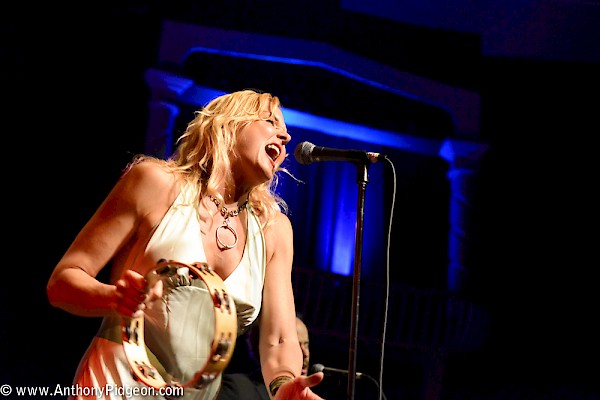 Storm Large celebrating the release of her latest record with a sold-out show at the Alberta Rose Theatre—click to see more photos by Anthony PidgeonAlthough so much is uncertain, Large has a mantra: “Follow the yes.”
Storm Large celebrating the release of her latest record with a sold-out show at the Alberta Rose Theatre—click to see more photos by Anthony PidgeonAlthough so much is uncertain, Large has a mantra: “Follow the yes.”
“Every time I felt scared of something that was offered to me or excited or didn’t think I could do it—that means yes!” she exclaims. “And you might fall on your face but even falling on your face is part of your next leveling.”
“You gotta take that chance,” Funk reinforces. Opportunities in this industry are fleeting, and “the window is so small, so if someone has some backing for you, just figure out how to do it.”
“If something feels completely inauthentic, that’s a no,” Large says. But “if it feels exciting and challenging,” follow the yes.
Saying yes means Large spends more than 200 days per year on the road, and will continue to for the foreseeable future. While Funk, with a family, is always looking for ways to get off the road, whether that’s producing other acts, playing in new bands, or opening his own studio.
Making it is not an end point, “it’s a verb,” Large explains. “It’s an unreasonable expectation because there are a lot of steps along an artist’s way.” You use one experience and “take the lessons from that and apply them to the next adventure, the next creative endeavor, the next performance.”
“There are a lot of perfect storms that happen too. What contributed to the success of The Decemberists?” Funk asks himself. “A shitload of luck went into that”—a lot of it was “just timing. It doesn’t happen for everybody for some reason. It’s not a board game with rules.”
“Once you’ve reached a point where you’re like: ‘I’ve done it all. I’m complete.’ Then you’re dead. You just die,” Large declares. “Because what’s the point of making it and then it’s done?”


